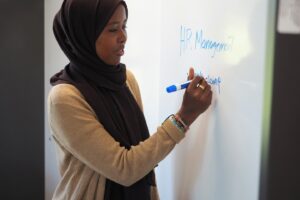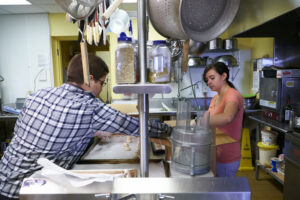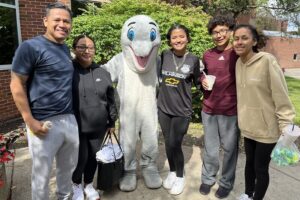Meet Le Moyne
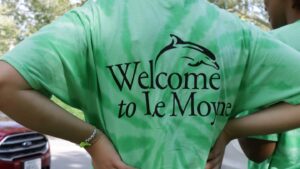
Welcome! It’s nice to meet you.
Allow us to introduce ourselves…
Discover a college where transformation meets purpose. At Le Moyne, a Jesuit college in Syracuse, NY, students of all backgrounds come together in an inclusive, mission-driven environment focused on academic excellence, cura personalis, and real-world impact.
How will a Le Moyne education shape you?
Put simply, it will provide you with the intellectual skills necessary to succeed in the world and the capacity to use your abilities to promote a more just society.

We Take Your Education Seriously
As a student on the Heights, you'll have the opportunity to study abroad, engage in meaningful service-learning projects and complete internships in fields of interest to you, all which will expose you to a variety of perspectives, cultures and ideas. You'll test your skills and interests against the day-to-day reality of a job, and you'll maximize your potential to do the most good in this world.
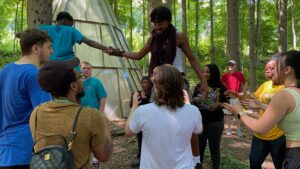
Big Things Await You
College is about so much more than the four walls of a classroom. It's where memories are made, firendships are formed, and lifelong passions are pursued.
Life on CampusBy the Numbers
97% of recent graduates report being employed or in graduate school within 6 months of graduation.
Top 20 North Regional Universities. – U.S. News and World Report
12:1 Student-to-faculty ratio
100% of students receive financial aid.
97% of recent graduates report being employed or in graduate school within 6 months of graduation.
Top 20 North Regional Universities. – U.S. News and World Report
12:1 Student-to-faculty ratio
100% of students receive financial aid.
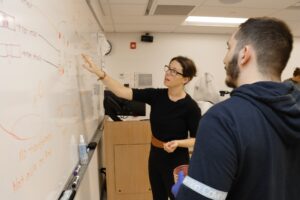
Le Moyne is where students discover who they are and how they can change the world with professors who know their names and care about their dreams.
Ethics and Self-Discovery
As a Jesuit institution, we are dedicated to creating a more just and ethical society. This commitment shapes the classes and the activities we offer and the opportunities you'll have on The Heights. We also have special events throughout the year focused on understanding the role that ethics plays in your life.
Global Connections
Have you ever dreamed of immersing yourself in another culture, experiencing the world through the eyes of a community so very different from your own? Are you excited to learn and live with others who also want to make a difference in the world, whether it’s across the street or across the globe? Our network of 180+ Jesuit colleges and universities around the globe provides unlimited opportunities to explore the world.
Living Lives of Impact
“People for others” is a pillar of our Jesuit values, inspiring service-based experiences from the moment you set foot on campus. Time and time again, our alumni cite group service projects, Campus Ministry, religion classes and the support of the broader campus community as the most impactful parts of their time as Dolphins, lessons they continue to embrace today.
Pop Quiz
Meet a few of the friendly faces at Le Moyne.
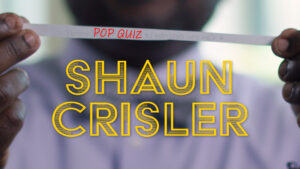
Meet Shaun Crisler, Associate Provost for Student Development.

Meet Meredith Tornabene, Director for Career Advising and Development.

Meet Furkan Oztanriseven, Ph.D., Assistant Professor of Business Analytics.

Meet London Wright, MSW, Staff Therapist / Outreach Coordinator at the Wellness Center.

Farha Ternikar, Ph.D., Director of Gender and Women’s Studies and professor of sociology.

Meet Darryl Caterine, Ph.D., a professor and historian of religious studies and culture.
Our Welcoming Community
Our Mascot
Meet Iggy the dolphin! Named after St. Ignatius, a nod to our Jesuit heritage, Iggy's favorite colors are green and gold (naturally). Why a dolphin? Syracuse, NY was named after Siracusa, Italy, a seaside city. And it's by no coincidence that dolphins are famous for their tenderness and known for traveling alongside people on their journeys.
Holding Doors is a Thing Here
At Le Moyne College, it’s remarkable how often you’ll find people holding a door open for a fellow student, staff, or faculty member. (It can feel quite odd at first!) But here’s the thing - this small act of kindness is indicative of the type of care and support you’ll find in every corner of our campus, a defining aspect of being a Le Moyne Dolphin.
Explore how Greatness meets Goodness here on the Heights.
Le Moyne College at a Glance
Le Moyne College is known for our strong academic programs, especially in the liberal arts, and our commitment to fostering a close-knit community. We are also recognized for our Jesuit values (one of 27 Jesuit colleges and universities in the United States), career preparation (97% of our recent graduates report being employed of in graduate school within six months of graduation), and dedication to providing financial aid (we commit approximately $50 million annually to financial aid, which helps 100% of our students).
Le Moyne College is known for our strong academic programs, especially in the liberal arts, and our commitment to fostering a close-knit community. We are also recognized for our Jesuit values (one of 27 Jesuit colleges and universities in the United States), career preparation (97% of our recent graduates report being employed of in graduate school within six months of graduation), and dedication to providing financial aid (we commit approximately $50 million annually to financial aid, which helps 100% of our students).
Le Moyne’s 160-acre suburban campus, affectionately known as “the Heights,” is located in Syracuse, New York (within a five-hour drive of New York City, Philadelphia, Cleveland, Boston and Toronto), is just minutes away from both downtown hotspots and breathtaking hiking trails. Ranked as one of America’s best college towns, Syracuse has something for everyone. Learn more about local attractions and our students’ area recommendations.
Le Moyne’s 160-acre suburban campus, affectionately known as “the Heights,” is located in Syracuse, New York (within a five-hour drive of New York City, Philadelphia, Cleveland, Boston and Toronto), is just minutes away from both downtown hotspots and breathtaking hiking trails. Ranked as one of America’s best college towns, Syracuse has something for everyone. Learn more about local attractions and our students’ area recommendations.
Le Moyne offers a range of undergraduate and graduate programs in the liberal arts, sciences, business, health professions, and education. See our undergraduate and graduate program offerings.
Le Moyne offers a range of undergraduate and graduate programs in the liberal arts, sciences, business, health professions, and education. See our undergraduate and graduate program offerings.
We believe so strongly in the uniqueness of our education and its power to do good in the world that we want to share it. Through our Promise Program, we are helping more people benefit from an education that focuses on mind, heart and spirit, and encourages students to make a difference throughout the world.
Our Le Moyne Promise to you is:
- We will provide you with an automatic scholarship
- We will prepare you for a career and keep you on track to graduate on time
- We will give you an education that delivers real, proven value
- We will ensure that you learn with and about people from an array of experiences and cultures
- We will get you where you want to go
We believe so strongly in the uniqueness of our education and its power to do good in the world that we want to share it. Through our Promise Program, we are helping more people benefit from an education that focuses on mind, heart and spirit, and encourages students to make a difference throughout the world.
Our Le Moyne Promise to you is:
- We will provide you with an automatic scholarship
- We will prepare you for a career and keep you on track to graduate on time
- We will give you an education that delivers real, proven value
- We will ensure that you learn with and about people from an array of experiences and cultures
- We will get you where you want to go
- Ranked among the top 15 percent of colleges and universities in the U.S. for undergraduate education by The Princeton Review.
- Top 20 North Regional Universities U.S. News and World Report
- #2 Best Value by U.S. News and World Report
- Five graduate programs ranked nationally in the U.S. News and World Report
- Top 15% in Nation in Money’s College Rankings
- Ranked among the top 15 percent of colleges and universities in the U.S. for undergraduate education by The Princeton Review.
- Top 20 North Regional Universities U.S. News and World Report
- #2 Best Value by U.S. News and World Report
- Five graduate programs ranked nationally in the U.S. News and World Report
- Top 15% in Nation in Money’s College Rankings
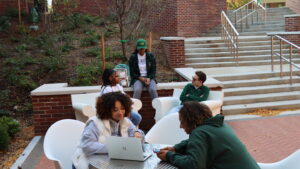

Now that we've introduced ourselves, let us share personalized information on our programs, life on campus, and our admission process.
Get to know us better


